A Evangelical Convert to Eastern Orthodoxy wrote one of most striking articles for the year at least to me. It spoke to me on many levels. That is THE THREEFOLD WITNESS OF THE CHURCH:THE CATHOLIC PETER, THE ORTHODOX JOHN, AND THE PROTESTANT PAUL. It is a very good article. He writes "can we gain that fuller vision that will enable us to see the Catholic, Orthodox, and Protestant Churches not only as diverse members in a single body but as three branches of that one eternal vine which is Christ our Lord. "
He then proceeds to Look at the three major "branches" as he calls it of the Christian Faith are shown by Peter, Paul, and John. By the way we Catholics Claim all Three :). However he hits a truth. Our Catholic heart and our soul is indeed Peter in many ways
I thought I would post this before I responded later tonight to Tobias's post A Befuddling Rebuttal Rebutted; Or, A Reminder that Jesus W. Christ, R-Nazareth, Is Just Another Anti-Christ We Should Resist! . Catholics , that truly try to live their Faith in an Orthodox way, are really at each other throats over politics right now. One just has to go to Vox Nova and look at the comment section. What is an "authentic Catholic " to do when he or she is confronted with all this politics nonsense.
It has been a tough year to say the least. We all have our issues as Catholics that hit us. The past two years was immigration reform for me. Why I don't know. I don't live in an area with lots of Hispanics. I don't know why I felt called to it. But I felt called regardless. It was not a "fun" issue.
Basically the far right and the far left just hated you alike if you stood with the President on this one. I took some arrows(and yes even some real threats) when I tried to make the case that what Trent Lott and Lindsey Graham, and George Bush were offering and advocating was truly attuned to Catholic principles. I said Rosaries and did battle at meetings, on the net , with family, and at Happy Hour. I racked up quite a phone bill in calling into radio talks shows . I slew whole forest(at the least the email equivalent) in the amount of letters to the editor and to pundits I wrote. It was consuming. Needless to say many Catholics of good faith disagreed with me, and that was OK. However, I was pretty exhausted after all that. In fact I was very exhausted and wounded. I really wanted to say screw it all. I will just be an observer now
Catholics of good faith are struggling with not only with immigration, but the war, economic issues, life issues, and a technology and medical breakthroughs that have long gone way beyond our moral reasoning capacity to toy with. Each Catholic has their own issues and often Catholics of good will and faith find themselves on the opposite side
However Catholics must be involved. In fact it is a important part of the "Catholic" Peter. This section of his article struck me as we Catholics struggle with political issues.
Central to the belief system of every Catholic is the identification of the apostle Peter as the first Pope, and in that first Holy Father, we see displayed in full all the glorious virtues and terrible vices of the Church of Rome. Peter is a passionate man of almost violent extremes. Out of all the disciples, it is he (inspired by the Spirit) who is the first to recognize Jesus as Messiah. In response, Christ praises him highly and even promises to place in his hands the “keys of the kingdom” (Matt 16:15-20). And yet, but a brief time later, the same Peter who boldly proclaims Christ’s status as “the Son of the living God” attempts to prevent him from fulfilling the Father’s plan. Jesus’ reaction is immediate. The same disciple on whom he had just lavished praise and promise now receives one of Jesus’ strongest rebukes: “ ‘Get behind me, Satan! You are a stumbling block to me; you do not have in mind the things of God, but the things of men’ ” (Matt 16:23; NIV throughout).
At the Last Supper (John 13), Peter first tells Jesus that he will not allow him to wash his feet (one extreme) and then insists that he wash not only his feet but his head and hands as well (the other extreme). After dinner, Peter pledges before Christ and the other disciples that he will lay down his life for his Master. Indeed, he even “makes good” on his pledge at the Garden of Gethsemane when he draws his sword and cuts off the ear of one of those sent to arrest Jesus: an action sure to cost him his life if he is captured. And yet, later that very night, he denies three times that he even knows Jesus. During one of his Resurrection appearances, the Risen Lord extends to Peter the blessed opportunity to supercede his triple denial by affirming three times his love for Jesus (John 21:15-19). Peter does so and Christ, after prophesying that he will die a martyr’s death, calls on Peter to follow him. Peter, both humbled and triumphant, sets out to follow, and yet, even here, the old Peter slips through, and he cannot help but question Jesus as to what the fate of the apostle John will be (verse 21).
Throughout her long and bumpy history, the Roman Catholic Church has been, I believe, the church that has most fully engaged the world around her. While Orthodoxy withdraws and Protestantism divides, Catholicism wrestles and grapples and gets her hands dirty. She makes mistakes (lots of them) but presses on nevertheless—ever struggling and yet ever maintaining her integrity and identity.
Like Peter, she grows and learns without ever quite losing that rashness and impulsiveness that defines her (for good and for ill). When God changed Jacob’s name to Israel (“he who wrestles with God”), he surely meant it as both a compliment and a criticism. The Israelites born out of Jacob’s loins proved (like Peter and the Catholic Church) to be wrestlers with God: now embracing his Word and with it setting the world on fire; now resisting that same Word and running after the world. When at her best, the Catholic Church (like Peter at Pentecost) stands boldly before the crowd proclaiming the message that is a stumbling block to the world; at her worst, she elicits the very rebuke that Jesus gave to Peter: “ ‘you do not have in mind the things of God, but the things of men.’ ” Yet still, ever and always, she persists and remains herself: a rock thrown in the river to trouble the waters.
One of the reasons that John Henry Cardinal Newman converted from Anglicanism to Catholicism was because he feared that the Bible alone was not enough to stand against what he called (in Chapter V of Apologia Pro Vita Sua) the “wild living intellect of man.” To combat this “universal solvent,” God ordained and appointed an institution (the Roman Catholic Church) “happily adapted to be a working instrument . . . for smiting hard and throwing back the immense energy of the aggressive, capricious, untrustworthy intellect.” The non-Catholic attacks Rome for being stubborn and inflexible and slow to change, but to level this often-just criticism is to simultaneously praise Rome for that inner, God-given nature which she shares with her first Pontiff. Part of the result of the Fall is that evil not only exists in the world but is inextricably intertwined with the good that remains.
We (people and churches) are all “package deals”: amalgams of strengths and weaknesses, virtues and vices. Indeed, our strengths and weaknesses, virtues and vices are so closely woven together that they cannot be separated from each other. This is a truth that every married couple must learn if they are to remain married. Consider the woman who is attracted to a man because he is popular and stands out in a crowd, but then, after she marries him, feels jealous and forsaken because he spends so much time socializing with others at parties. Consider the man who is attracted to a woman because she is innocent and a bit gullible, but then, after he marries her, yells angrily at her every time she is coaxed by a salesman into buying something that she does not need. What our hypothetical woman and man do not understand is that the quality or behavior that irks them in their mate is inseparable from the very thing that attracted them to their mate in the first place.
God has, I would submit, chosen the Catholic Church to keep alive the spirit and witness of Peter in all of its contradictory (or, better, paradoxical) extremes. If she is to complete her mission, if she is to continue to stand (to quote Newman again) as “proof against the energy of human skepticism,” if she is successfully to rescue the freedom of thought “from its own suicidal excesses,” then she is going to have to be a bit stubborn and stiff-necked at times. That is not to absolve her of guilt when her stubbornness falls into pride and sin and disobedience, but it is to assert that her flaws and frequent slips are part and parcel of that divine mission which she, and she alone, has been given the grace to fulfil. Just as every parish needs at least one Peter to be both its rock and its rabble-rouser, so the Universal Body of Christ needs its Catholic branch to both center and disturb it.
I linked Peter above to the theological virtue of hope, and indeed, the older, wiser, chastened Peter of the epistles begins his first general letter by praising God for giving us a “new birth into a living hope” (1 Peter 1:3). To read 1and 2 Peter is to peer into a mind and a heart that have learned patience and humility and fortitude. Tame he is definitely not (cf. his condemnation of false teacher in 2 Peter 2), but his years of ministry and persecution have taught him to look ahead and to trust in the promises of the Lord: “The Lord is not slow in keeping his promise, as some understand slowness” (2 Peter 3:9). His eyes are trained forward, and he has learned finally what it means to be in the world but not of it.
Throughout that long theological and sociological experiment we call the Middle Ages, the Catholic Church strove to find the right balance between full investment in the world and radical disengagement. Her Petrine vision of hope taught her to live in a suspended state of tension poised between her political and aesthetic attempts to perfect society and culture and her more monastic impulse to dismiss this earthly field as a vale of tears and focus only on the Kingdom to come. Two extremes kept in perpetual tension by a Church that never ceases to wrestle with man and the world. “There are an infinity of angles at which one falls,” writes G. K. Chesterton (that other great Anglican convert to Catholicism) in Chapter VI of Orthodoxy, “only one at which one stands.” Perhaps Rome’s greatest and most vital legacy is that she has continued to stand when she should have fallen flat on her face a dozen times. And in this above all is she truly the living theological and institutional embodiment of the spirit and witness of St. Peter.
All I have to say is Apostle Peter and St Thomas Moore Patron Saints of Politicans!!! Pray For us!!!!
Friday, November 9, 2007
The Apostle Peter and the Politics of an American Catholic
Posted by
James H
at
11/09/2007 03:46:00 PM
![]()
Labels: Catholic, Catholic Politics, democrats, GOP, immigration, Orthodox/Catholic Apologetics, Saints
Subscribe to:
Post Comments (Atom)

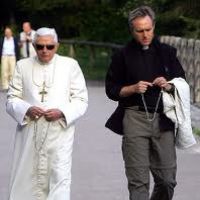

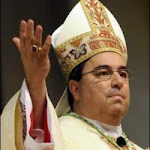



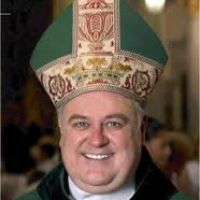
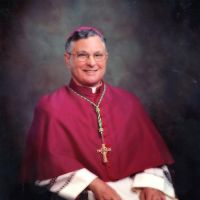
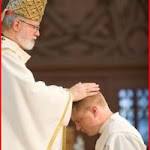
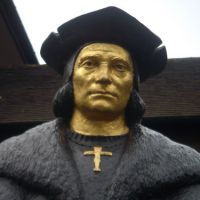
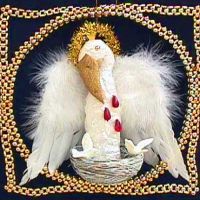
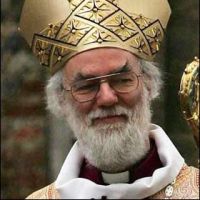
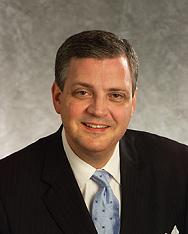
No comments:
Post a Comment